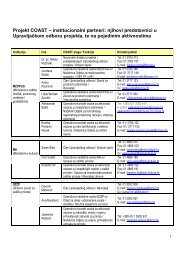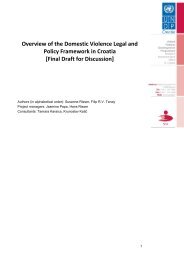WEB engleska verzija end.indd - UNDP Croatia
WEB engleska verzija end.indd - UNDP Croatia
WEB engleska verzija end.indd - UNDP Croatia
- No tags were found...
You also want an ePaper? Increase the reach of your titles
YUMPU automatically turns print PDFs into web optimized ePapers that Google loves.
POLICY RECOMMENDATIONSCHAPTER 55.3 Deinstitutionalisation and theDevelopment of Social ServicesAs has been highlighted in Chapters 3 and 4, atpresent <strong>Croatia</strong> still dep<strong>end</strong>s heavily on the use ofinstitutional settings for groups such as children withdisabilities, children separated from their parents,adults with intellectual and physical disabilities, andjuvenile and adult off<strong>end</strong>ers. The effect of institutionalisationincreases isolation from family and socialsupport networks and increases dep<strong>end</strong>ence and exclusion.Reducing indep<strong>end</strong>ence on institutional carein favour of developing community-based servicesand family care should be a high priority. This furtherpromotes inclusion since it enables vulnerable individualsto participate to the fullest extent possible insocial and economic life. Thus, the existing networkof social support and care services also needs todevelop, which particularly refers to improving thequality, coverage and accessibility of social services atthe local level. Local social services need to becomea first point of contact, providing information andadvice on the ground, while ensuring that a range ofservices are provided in a more integrated manner.Integrated social services mean effective coordinationacross areas such as social housing, health services,education and training services and employmentservices. Consequently, this also requires the mobilisationof a range of different actors in providingsupport that include partnerships between stateagencies, local authorities, NGOs and the private sector,which can all more efficiently deliver services atthe local level.For those leaving institutions it is very important todevelop tailored packages of support to assist theirintegration into society and employment. For thosewho remain in institutions it is important that thoseinstitutions develop strong links with local communitiesand local services as much as possible. Forinstance children in institutions should, whereverpossible, be educated in local schools and take partin local social, recreational and sporting activities.Recomm<strong>end</strong>ations for reducinginstitutionalisation- Develop community care services at the locallevel to support the deinstitutionalisation ofpeople with disabilities and ensure links withhealth, education and training services;- Develop support in the community thatfosters the indep<strong>end</strong>ent living of people withdisabilities such as: 1) introducing a systemof personal assistants, and 2) developing thesupporting role of NGOs;- Develop provision of specially adapted socialhousing for people with disabilities;- Improve physical accessibility to buildings andtransport;- Develop support and training to increase employmentaccess for people with disabilities;- Improve the financial indep<strong>end</strong>ence of peoplewith disabilities by revising the system ofbenefits so that disability benefits are paid onthe basis of a degree of disability and not onthe basis of the cause of disability;- Ensure access to and opportunities toparticipate in recreational and cultural activitiesin the community;- Develop education and training programmesto counter discrimination and to promoterecognition of rights, abilities and needs ofpeople with disabilities;- Develop fostering and adoption services forchildren at risk.149

















